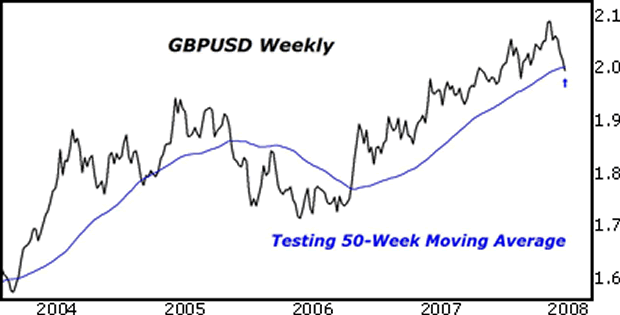British Currency Ready for a Pounding!
Currencies / British Pound Dec 23, 2007 - 12:31 AM GMTThroughout the year, we've told you why the U.S. dollar was weakening. The reasons are many, and most of them are still relevant.
But as 2007 winds down, I want to tell you what could be next year's biggest trend: Some other currencies feeling similar pressures. You see, the credit crunch is expanding, and so is the list of vulnerable parties.
The biggest winner: The Japanese yen as fear overwhelms the market and investors flee from risk.
The biggest loser: The British pound.
How Central Bankers Are Trying To Solve the World's Problems
Two weeks ago, the U.S. Federal Reserve and four other global central banks announced a plan to flood the banking system with money.
Specifically, the Fed is to auction a minimum of $40 billion in funds to banks in an effort to ease the blockage in the money markets and shore up bank balance sheets. It's also authorizing $24 billion in currency swap lines to channel tens of billions of dollars to other financial institutions based in those banks' jurisdictions.
This past Monday, the European Central Bank (ECB) took things one giant step: It pumped the equivalent of $500 billion into the financial system. This is in addition to the money it promised under the central bank co-op deal with the Fed.
And all this easy money comes with inflation running above the ECB's comfort levels!
The bank's president, Jean Claude Trichet, has made it clear that bank members will remain focused on the heated pace of inflation, that they are not in a position where rate cuts are an option.
If the ECB is forced to do a U-turn and cut rates, the euro could suffer. That could take some time, however.
Right now, things look even more dire in the U.K. ...
The British Pound Is Losing Sight of Its Happy Place
Shortly after a dramatic push above the $2 level, I began expecting the British pound to hit a rough patch and fall back.
Why? Because sentiment became overly bullish even as the fundamental backdrop in the U.K. was deteriorating!
The market was at a point where it didn't care what was happening in the U.K. economy and across the globe — everyone was buying pounds — lots and lots of them. The pound had found its happy place!
But as the credit crisis spread beyond U.S. borders, the question marks began to surface in the U.K. No one seemed to take notice until customers lined up outside of Northern Rock bank branches across Great Britain to withdraw their savings. Investors were stopped dead in their tracks.
[Editor's note: The run on Northern Rock came after the Bank of England provided emergency funds to help the bank cover their subprime-related losses. It was the largest bailout of a U.K. bank in the last thirty years.]
Surely the subprime mortgage fiasco from the U.S. couldn't pervade a bank all the way over in England? Orcould it?
Apparently, it could. And the fallout is continuing today, which is why ...
The Bank of England Will Keep Lowering Rates, Pushing Down the Pound's Value
Like the rest of Europe, plenty of soft spots are popping up in the U.K.'s economy.
But unlike the European Central Bank, the Bank of England is already lowering interest rates. And I think that downward trend is likely to continue. Why?
Reluctance among the country's mortgage lenders is taking its toll. U.K. house prices fell for the third consecutive month in November.
And thanks to growing credit woes, the central bank expects a consumer slowdown will lead to an overall economic slowdown next year.
Meanwhile, the latest inflation numbers seem to give the Bank of England little wiggle room. Earlier this week, a report showed November consumer prices in the U.K. rose less than expected.
With inflation only an afterthought, a heavy weight has gotten lifted off the BOE. They may be able to juice up the U.K. economy — or at least give it a try.
This Is the Perfect Time to Get Positioned for a Falling Pound!
As rates in the U.K. come down, the British pound will struggle mightily to compete with other currencies around the world.
In fact, as the corresponding chart shows, the pound is already in dangerous territory:

As you can see, the pound has fallen below $2 for the first time in four months. It's also testing its 50-week moving average.
In my opinion, there's quite a lot of room to fall once it breaks below these levels.
If you subscribe to my World Currency Options Alert , you're already well prepared for this. If not, I strongly suggest you look into vehicles that can take advantage of a decline in the pound.
The profits from this move could be immense. Heck, the last time Britain's currency got pounded back in 1992, legendary trader George Soros walked away with a cool $1 billion!
Best wishes,
Jack
P.S. If you're not currently a member of my World Currency Options Alert , I'd like to extend a very special holiday invitation to you. Click here for the details .
This investment news is brought to you by Money and Markets . Money and Markets is a free daily investment newsletter from Martin D. Weiss and Weiss Research analysts offering the latest investing news and financial insights for the stock market, including tips and advice on investing in gold, energy and oil. Dr. Weiss is a leader in the fields of investing, interest rates, financial safety and economic forecasting. To view archives or subscribe, visit http://www.moneyandmarkets.com .
Money and Markets Archive |
© 2005-2022 http://www.MarketOracle.co.uk - The Market Oracle is a FREE Daily Financial Markets Analysis & Forecasting online publication.



